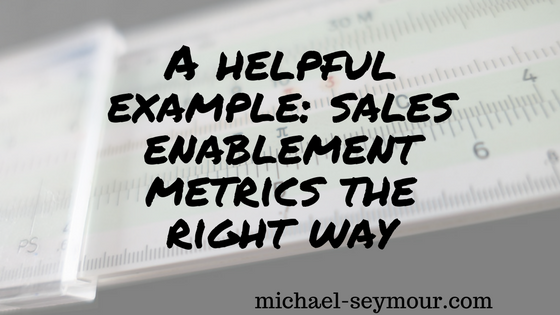At the Denver Sales Enablement Society meeting, we held a quick discussion on sales enablement metrics, and one member mentioned her organization meticulously collects metrics on sales enablement. I knew I needed to write a blog post exploring this.
Sales enablement metrics
To start with, I firmly believe that is it quite vital to measure sales enablement. Really you should collect metrics on any marketing or sales program. When push comes to shove, you should only be investing in things that deliver value. And the only way to prove value is to collect objective metrics about performance. Everything else is just for show. And with a new field like sales enablement, this is especially true.
With that said, I know that many people don’t actually do this. So my ears perked up when Miriam Shockley from Gusto mentioned that she does so religiously. I set up a quick discussion to dive into details about this with her.
About Gusto
To start with she pointed out that Gusto is a unique firm. They deliver an HR, Payroll and Benefits SaaS solution to over 40,000 small businesses across the country. They are a tech unicorn and appear ripe to go public. With that said, they do have a slightly different culture. For instance, they don’t allow shoes to be worn in the office. And another part of the culture is metrics. Their founders are religious about metrics and are part of the “Objective and Key Results” process that drives much at Gusto. In turn, this means everything is measured. Shockley explored, “I have worked as a sales trainer in three companies. And this is very different than what I have seen before (with regards to metrics).”
Sales enablement metrics at Gusto
So I inquired what exactly did she measure and why. As mentioned, she does sales training (no titles at Gusto either). And before she starts any program she picks what to measure, then benchmarks it. Shockley stated, “What is this problem affecting in terms of metrics and measurement?” After the program is completed, she re-measures them. Being a SalesForce whiz helps with this, and she pulls the reports herself. For the program we discussed she looked at conversion rate and days in the sales cycle, looking to increase the first, and decrease the second. For the program discussed, she indicated she saw a noticeable difference but the scale was single digit improvement. Her enthusiasm on the subject was noticeable adding, “If you can’t measure the business impact, how do you know you are accomplishing any goals?”
My first inclination was to ask about how management received them. I know at Oracle, our management team was skeptical of any numbers showing improvement other than revenue. Shockley indicated that wasn’t the case with Gusto, “Management recognizes that it is hard to attribute changes to anyone program, but they appreciate the measurement process.”
Sales enablement metrics as a core activity
It was good to hear about a sales enablement professional that engages in this sort of behavior. The reality is that she is in the minority. I do get a bit of pushback when I say that, but I know it is the case. Why? Just look at sales enablement vendor success stories, they rarely have metrics in them. In fact, when I offer the metrics I saw, the vendors are astonished that someone measured it.
This is a real problem. Sales enablement is relatively new as a field. In other sales and marketing professions, measurement is an expectation. Ask any sales manager and they know where their team stands in terms of quota achievement. Ask any demand gen lead, and they can cover the basic lead metrics. For sales enablement as a profession to mature, this has to be part of the process.
So what should you do? Identify the metrics to effect, benchmark them, implement and then measure again. I have a variety of posts on the matter. link. link. link.If you need help on this, I can help. Call me @ 303-956-3185, use the contact page or email me at michael @ michael-seymour.com to get a free consultation on completing win loss analysis.
 About Miriam Shockley: Miriam Shockley is a sales training and enablement enthusiast, with a passion for innovative technology companies. Miriam got her Master’s Degree in Adult Education and Training from Colorado State University and loves putting it to work everyday. She has been a Sales Trainer at three Colorado software companies and has gone public with two.
About Miriam Shockley: Miriam Shockley is a sales training and enablement enthusiast, with a passion for innovative technology companies. Miriam got her Master’s Degree in Adult Education and Training from Colorado State University and loves putting it to work everyday. She has been a Sales Trainer at three Colorado software companies and has gone public with two.

